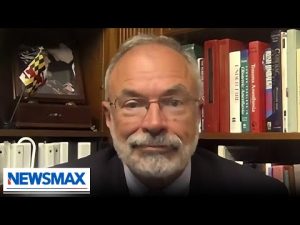In a recent discussion about immigration policy, a prominent figure from the Trump administration advocated for significant reforms to the H-1B visa program, which allows skilled workers to come to the United States. During the conversation, it was highlighted that American colleges produce some of the brightest minds from around the globe. Many of these graduates want to stay in the U.S. after completing their degrees but often find themselves facing barriers that force them to return to their home countries. The suggestion made was simple yet bold: graduates from universities, including community colleges, should be granted green cards upon earning their degrees.
This proposal does not only resonate with the idea of retaining talent but also addresses the unfortunate reality in which some graduates leave only to create successful businesses abroad. Picture this: a brilliant engineer or entrepreneur has everything lined up to innovate in the U.S. but is unable to do so due to visa restrictions, sending them back to countries like India or China, where they can flourish. These talented individuals could be contributing to America’s economy and job market but instead become competitors overseas. It sounds like a lose-lose situation, wouldn’t you agree?
Amidst this discussion, the conversation shifted to the current immigration crisis and the importance of securing the U.S. borders. The former “border czar” Tom Homan stressed that the immigration policy under the Trump administration was primarily based on merit. While he refrained from detailing specific policy plans for the next administration, he did allude to a possible return of family detention centers as a component of managing complicated family cases related to immigration. These centers would allow time for investigations into family claims and ensure children are protected—an objective that seems increasingly relevant in today’s turbulent immigration landscape.
Homan faced some pushback for discussing family detention, which many critics have labeled as cruel. Yet he pointed out the hypocrisy in the political responses to these policies. Previously, family detention was accepted under the Obama administration but faced scrutiny when associated with the Trump administration. Homan argued that the arrangement serves to protect children from the dangers of trafficking and improper vetting. It’s a tricky subject, and it seems that any mention of detention—family or otherwise—quickly stirs up strong reactions on both sides of the political divide.
Throughout the dialogue, there was an emphasis on the need for accountability in immigration policies. Homan expressed a firm stance against illegal immigration, arguing that it has led to tragedies and increased crime rates in the country. The alarming statistics shared about the dangers faced by women and children during their journey to the U.S. border were chilling. It was revealed that the risks of sexual assault and trafficking are terrifyingly high, elevating the need for immediate and effective policy reform.
In conclusion, the conversation around America’s immigration system remains as heated as ever. With ideas proposed to alter the H-1B visa system and a focus on securing the borders, the goal remains clear: to maintain a balance between welcoming immigrants who wish to build a future in the United States while also protecting the nation from the perils of illegal immigration. It’s a tall order, but the stakes are high, and the clock is ticking. By exploring these avenues, the hope is to not only strengthen national security but also to preserve the incredible opportunities that the U.S. has to offer to the world’s brightest minds.







